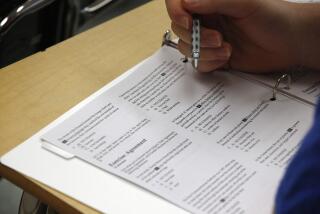Other Schools Not Expected to Follow Harvard in Dropping Test : MBA Entry Exams Likely to Stay
- Share via
The standardized admissions test for MBA programs may have gotten a failing grade from Harvard Business School, but don’t expect other schools to follow suit, admissions officer say.
After using the test in the admissions process for three decades, Harvard officials decided to chuck it and instead rely solely on criteria such as grade-point average and work experience to decide who will be admitted to their business program, regarded as among the world’s most prestigious.
But admissions officers across the country said that other business schools are not likely to follow Harvard’s lead. Still, many welcomed the action as a signal to those students and administrators who over the years have overemphasized its value.
The 30-year-old Graduate Management Admissions Test, or GMAT, is administered by Educational Testing Service, a nonprofit concern based in Princeton, N.J., that is among the nation’s leading test developers. The 2 1/2-hour, multiple-choice exam measures verbal and mathematical skills and is used by 700 graduate business schools worldwide, including most U.S. schools offering a master’s in business administration, or MBA.
Educators say that Harvard’s decision will fan a growing controversy over the use of standardized test scores in the admissions decision, an often grueling process that determines who gets into the country’s top schools. Academic degrees increasingly have become minimum requirements for many jobs, and individuals with credentials from top-notch schools often have an edge over those with degrees from less prestigious schools.
Harvard said the GMAT is not a good measure of traits such as leadership ability or ingenuity. “We want to select people who we think will become outstanding general managers,” said John Lynch, admissions director of the Harvard Business School. “We don’t think standardized test scores add anything to that process.”
“We plan to keep the GMAT, but Harvard’s decision is a good message to everyone to de-emphasize the significance of the test,” said Stanford Business School Director Gary Williams. Like many graduate business schools, Stanford finds that the test is a good predictor of a student’s grades during the first year of the MBA program and therefore uses it only to weed out applicants who would have trouble academically.
Said Eric Mokover, admissions director at UCLA Graduate School of Management: “Predicting academic performance--and only first-year performance--is the only thing that test was ever intended to do. And it’s not even very good at doing that if you don’t use it in conjunction with grades and other activities.” He said that is why UCLA rejects many students with high GMAT scores.
The controversy is not limited to business schools. Johns Hopkins University’s medical school last May dropped the standardized Medical College Admissions Test. The Scholastic Aptitude Test, the most widely used standardized admissions test for undergraduate school, is optional at Sarah Lawrence College in Bronxville, N.Y. Harvard College and other schools say they may follow suit.
More to Read
Inside the business of entertainment
The Wide Shot brings you news, analysis and insights on everything from streaming wars to production — and what it all means for the future.
You may occasionally receive promotional content from the Los Angeles Times.










